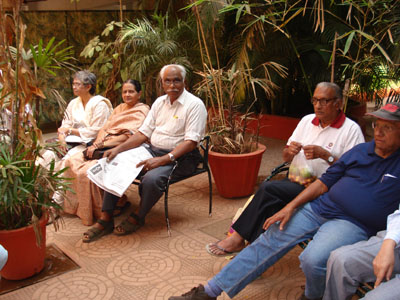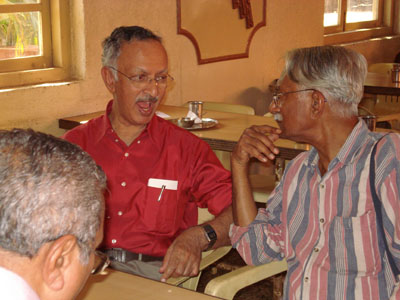
Some of the Class of 1955, in a relaxed mood.
|

Abraham Thomas and Chinappa,
active drivers of the get-togethers.
|
CEG 55, the Class of the College of Engineering, Guindy, which passed out in 1955, were determined to meet at least once a year to acquaint themselves of the events of the year past. I recall the silver jubilee meet quite clearly. Vintage photographs pinned on the notice board, identification of each of the members, their credentials, milestones and, of course, the families were proudly presented. After which a solemn promise was made to make this an annual affair. And so we went on to the Golden Jubilee, which was celebrated on a grand scale, souvenirs brought out, old teachers were present to give their blessings to the group to go on.
In the words of Abraham Thomas, an active member, "These engineers began careers in the PWD and other Government departments, the railways, in multinational corporations or prestigious universities. Over the years, they built irrigation canals, highways and even a bridge across a sea. They built new railway lines and signalling systems. Some joined the army and served in remote, snow-covered reaches of the country, participated in historic events, or adapted defence technology to be the best in the world. They were honoured by Presidents and walked with Prime Ministers. They advised countries on the transmission of power or the setting of international standards in communications. They sat in on, or chaired, international committees that set the course of technology for the country and the world. They set up schools and colleges and even hospitals in India and abroad. That is the Class of 1955."
They have met in Goa, Lonavla, Kodaikanal, Cochin, Bangalore, Mysore or Kanniya¬kumari. The numbers have dwindled, but whoever can come makes it. One member had just recovered from a stroke, and his wife from a heart attack, but they came all the same. Another person needed to have dialysis every alternate day, but flew down from the US to be amidst his classmates. One of the wives is a cancer survivor with a severe kidney ailment, but she just wouldn't be left out and her husband gave her full support. Wives whose husbands had passed on, attended – such was the determination.
Prof. C.T. Sriramulu, alum¬nus 55 batch, was felicitated for the four awards he received at the Alumni Centre, Best Citizen's Award, Best Teacher's Award, Indira Gandhi Award, and the Glory of India Award, from Dubai. Addressing the gathering, Prof. Sriramulu requested donations for establishing endowment scholar¬¬ships for needy students. The interest from the endow¬ment fund could be used to give medals to students on the Annual Day, medals made of silver and plated in gold. Contributors could specify the branch, the subject, the mini-mum mark to be scored and the year of study for the award. Each endowment amount, fixed at Rs.15,000 until last year, is now revised to Rs. 20,000.
Donations would be welcomed for the Building Fund, too and/or for the Scholarship Fund which could be utilised to assist students going abroad for presenting papers. Chairman of the awards committee (044 24744624 / 24744687), who also organised this year's reunion of CEG 55, supported Prof Sriramulu's appeal.
The last reunion, held recently, had about 25 members attending. The men were all in the late seventies and whoever was present did not show signs of senility. They contributed the money collected from the members for a full scholarship to an engineering student last year.
The special invitees were the teachers Prof. S. Natarajan, President, AACEG, accom¬panied by his wife, and Dr. Mani Sundaram, who retired as the Vice-Chancellor of the Bharati¬dasan University, and who gave inspi¬rational advice.
The special invitees were the teachers Prof. S. Natarajan, President, AACEG, accom¬panied by his wife, and Dr. Mani Sundaram, who retired as the Vice-Chancellor of the Bharati¬dasan University, and who gave inspi¬rational advice.
What made these meetings so special, what was the bond that they had? Vasanth Kumar, who was here from Dallas, USA, said that they owed a lot to the College and to the teachers; both had a great influence on their lives. The teachers who were but 6 to 8 years older than their students remarked that they were always accorded respect from the batch and this made their work easier. The CEG 55 batch which was the forerunner of all the batches of alumni continued to meet at different times of the year. The older batches were setting an example to the younger lot to contribute both monetarily and morally to the present generation of students. "May you continue to meet every year, as long as the mind and body stay agile, and may you always be a source of inspiration," concluded Dr. Mani Sundaram.
The Vice-Chancellor of Anna University, Dr. P. Man¬nar Jawahar, Dr. M. Sekar, Dean, CEG, P Shanmugavel, Registrar, Anna University, and Prof. Natarajan, President, AACEG, were present and they promised their continued support to the alumni of the University.
Prof. Natarajan, Guest of Honour, said he was over¬whelmed by this gathering. The Reunion was an intimate, inspiring, social meet. He offered prayers in thanksgiving. The group was like isolated strings that together made great music. A Reunion is a landmark occasion. He complimented the '55 batch as a vibrant, versatile group with a strong value system. He felt teachers who help out are best remem¬bered and said, "Never say to a student it is a wrong answer but lead him or her to the right answer." He wished the alumni, his students, a life of fulfilment and unmixed joy.
Prof. Vithal, '55 batch, applau¬¬ding the power point presentation on Kancheepuram Silks by Sabita Radhakrishna, said that women are the upholders and custodians of invaluable heritage and tradi¬tions. He felt spouses of '55 batch deserved to be compli¬mented for their enthusiasm and support.
Plans for the Diamond Jubilee were afoot, and N.T. Swaminathan reminded the gathering that contributions should start pouring in for the celebrations.
Was this a social get-toge¬ther or did it go deeper? As I mused on it, I thought that the collective contributions of these talented men would be valuable. Were it possible to build a talent bank, I would vote for it. If educational institutions would be willing, these men, each a specialist in his own field, could contribute immensely based on rich experience and maturity. The older man in turn would learn from the young professional current trends in technology and engineering, and understand the needs of the moment. This would go a long way in staving off the feeling of uselessness and depression in old age, and being passed over as a 'has been'.
There is a time in the life of each of us where the ravages of time and advancing age will have positioned us in a different dimension, but woe to us if we think that we are finished and wait for illness and death to claim us. The human mind is indeed powerful; and a youthful mind and a yearning to learn new skills, and still be able to laugh, will carry us a long long way and keep us healthy. That's what reunions do.
|